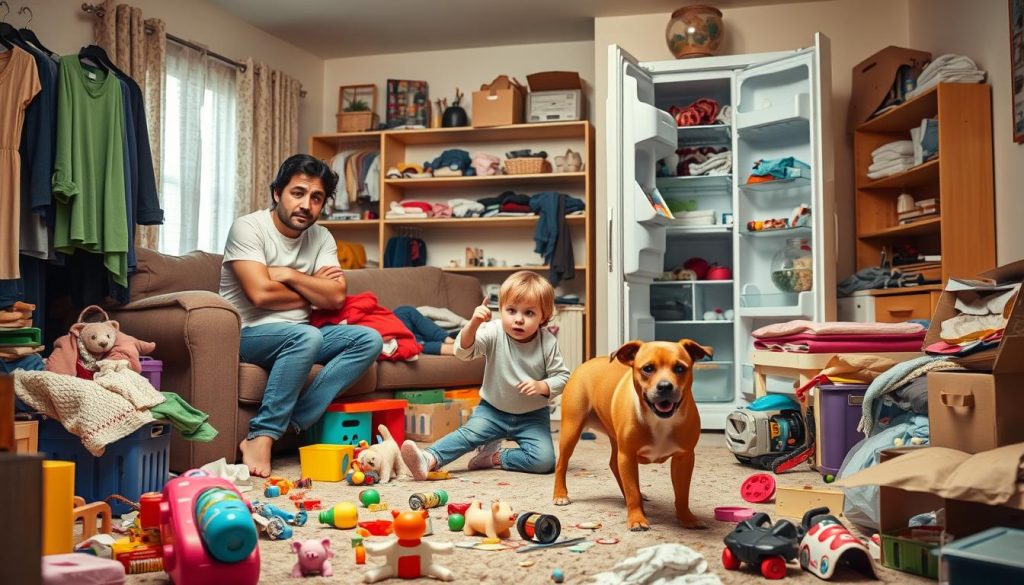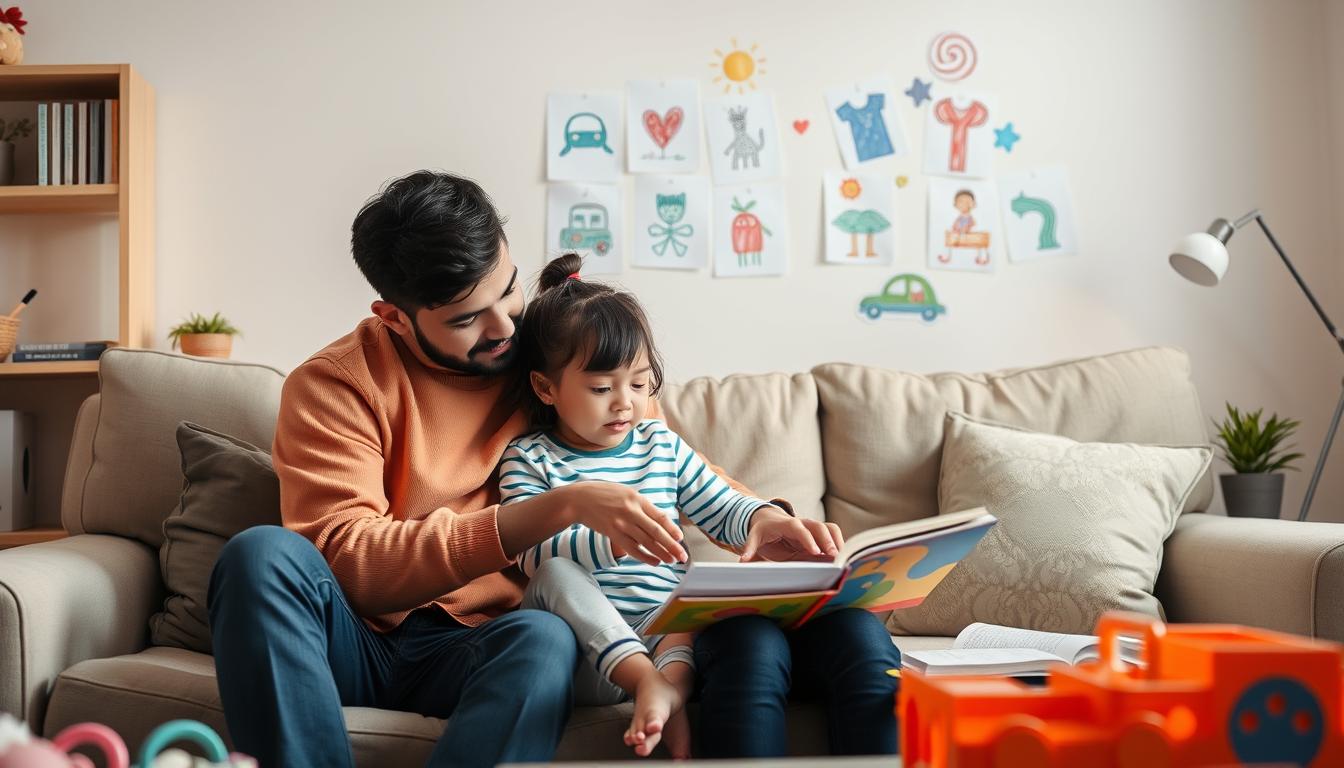Is using guilt trips to control your child really the best approach? Parenting teens is tough, filled with challenges that test your authority and their independence. Guilt trips might seem like a quick fix, but they can harm your relationship in the long run. It’s time to rethink this common but flawed method.
Key Takeaways
- Guilt-tripping is considered one of the least effective parenting strategies by experts.
- Frequent guilt trips can lead to long-term negative impacts on the parent-child relationship.
- Children exposed to guilt trips often struggle with low self-esteem and confidence.
- Effective alternatives like open communication and consistent rule enforcement are crucial.
- Transitioning from guilt-based to mindful parenting can foster healthier, more respectful relationships.
We’ll explore the harm caused by guilt trips and look at better ways to build a strong, loving bond with your child.
Understanding Guilt Tripping and Its Consequences
Guilt tripping in parenting means making kids feel guilty or ashamed to control their actions. This method is not effective and can harm kids for a long time. Research shows it’s more common than you think, especially where parents struggle with communication.

What Is Guilt Tripping?
Guilt tripping happens when parents use sneaky ways to control their kids. For instance, a mom might make her daughter feel bad about her friends or partners, as a 2014 study found. This behavior often comes from parents feeling out of control and using guilt to get what they want.
Negative Effects on Children
The effects of guilt tripping can be very bad. Kids who experience it might feel bad about themselves, get depressed, and face big parenting challenges later. A 2020 study found that kids who are depressed often feel more guilty, especially when parents reject them or shut them down. This can lead to eating disorders or anxiety issues in kids.
Long-Term Impact on the Parent-Child Relationship
Guilt tripping can hurt the relationship between parents and kids over time. A 2013 study found that constant guilt trips can make kids resentful. This can make kids feel distant from their parents. Also, guilt can make anxiety, depression, and OCD worse, as a 2010 study showed. Getting help from professionals can help fix these problems and improve emotional health.
Effective Alternatives to Guilt Trips
Switching from guilt trips to better parenting means talking clearly, setting doable goals, and being consistent. These steps help build better relationships with your kids and help them grow.

Establishing Good Communication Skills
Good communication is key for positive parenting. Talk openly and honestly with your kids. This makes them feel important and encourages them to share their thoughts, like about money, screen time, and consent.
Good talks build trust and help solve problems without fights.
Setting Clear Expectations and Limits
It’s important to be clear about what’s expected and what’s not allowed. When kids know the rules, they’re more likely to follow them. Make sure they understand rules about screen time and daily life.
This helps them see the value of rules and makes your home happier.
Being Consistent with Rules and Consequences
Being consistent with rules and consequences is key for good parenting. When rules are the same, kids feel safe and know what to do. It’s also important for parents to act as good examples and give helpful feedback.
This way, kids learn to be responsible and confident without feeling guilty.
Parenting Challenges: Why Guilt Is Not the Answer
Guilt often comes from feeling like you’re not spending enough time with your kids. Studies show that up to 70% of parents feel guilty about this. Also, 85% struggle with setting boundaries because of guilt and fear.
Using guilt to keep close to your kids might make them comply at first. But it can lead to them feeling resentful and emotionally disconnected. This can make your relationship with your child strained.
Parents who use guilt to control their kids might feel left out as their children grow up. Your child might seem to agree but secretly feel manipulated. This can cause them to shut down emotionally or become more private.

Guilt also makes it hard for parents to discipline their teens effectively. About 90% of parents think guilt gets in the way of discipline. This can make it tough to set clear rules and structure for your teen.
It’s important to see guilt as a potential manipulator, not just a sign of caring. Around 80% of parents struggle to move from feeling guilty to truly remorseful. This can make it hard to create a supportive environment for your family.
Modern parenting comes with many challenges, like dealing with sibling rivalry and keeping kids safe online. Social media makes it easy to compare and feel inadequate. Understanding guilt’s role in parenting can help you build stronger relationships and better parenting strategies.
It’s key to tackle these emotional barriers to improve parenting. By overcoming guilt, you can create a more trusting and respectful environment. This means setting clear rules and consequences without fear or resentment.
Building Healthy Parent-Child Relationships
Building strong relationships with parents and caregivers is key for a child’s growth. Warm and caring interactions help kids feel loved and safe. It’s important to talk openly and honestly to build trust and respect.

Open and Honest Communication
Good communication is the base of healthy parent-child bonds. Spending quality time together helps both sides understand each other better. Talking about puberty and body positivity can strengthen your emotional connection.
Rebuilding Trust After Guilt Trips
If guilt was used in the past, rebuilding trust is crucial. Recognize the harm guilt trips can cause and aim for respect. Keeping promises and respecting your child’s feelings can help regain trust.
Seeking Professional Help if Needed
At times, getting extra help is necessary to mend the relationship. Family counseling can be very helpful. It can tackle tough issues like remarriage and children. The Texas Parent Helpline at 833-680-0611 is always ready to assist.
Conclusion
Using guilt to control kids might seem to work at first. But it doesn’t create a strong, loving bond between parents and children. Instead, open talks, clear rules, and fair parenting are better. These methods help build trust and respect in the family.
When problems come up, it’s important to watch out for guilt cycles. Getting help when needed can stop these cycles. This way, families can grow stronger, based on understanding and respect.
Talking about postpartum mental health, sports coaching, and talking to kids about drugs is also key. Using eco-friendly parenting strategies teaches kids to care for the planet. This makes the family bond stronger.
Studies show that active parents, especially dads, greatly benefit kids (Rosenberg & Wilcox, 2006; Ramchandani et al., 2013). When both parents are involved, kids do better in school and life (Sheridan et al., 2010).
Special programs for parents can help prevent child abuse (Smith et al., 2012). Including dads in these programs helps kids feel better and behave better. This leads to happier, healthier kids.
Embracing the Journey of Mindful Parenting
Mindful parenting means being fully present with your kids, even when things get tough. It’s about facing emotions head-on but not letting them control you. This way, you can balance being a parent with taking care of yourself.
Neuroscience shows that strong feelings like guilt can mess with our decisions. Mindfulness helps you pause, think things over, and choose guilt-free parenting.
About 85% of parents think mindfulness boosts their emotional health and connection with their kids. It helps manage stress and improve how you talk to your children. For example, mindful parents often feel closer to their kids, up to 95%.
Playing, telling stories, or acting out roles can make you and your child more empathetic. Simple activities like breathing games or crafts can also help your child stay in the moment. Yet, up to 70% of parents struggle to fit mindfulness into their busy lives.
But, with regular practice, like feeling grateful, 73% of parents start to appreciate parenting more. Mindful parenting is a journey that never ends. It helps you navigate through tough times, like divorce or dealing with middle child syndrome.
By understanding these challenges, you can create a loving and balanced home. Mindful parenting is becoming more popular, leading to stronger, healthier family bonds.
FAQ
What are the negative effects of guilt tripping on children?
How can guilt tripping damage the long-term parent-child relationship?
What are healthier alternatives to guilt trips in parenting?
How can I improve communication with my teen without using guilt?
What steps can I take to rebuild trust after using guilt trips?
When should I seek professional help to address guilt-related issues in my family?
How does mindfulness help in better parenting?
What are some strategies to deal with sibling rivalry without guilt tripping?
How can I ensure my child’s safety on social media?
What can I do to support my child with anxiety without relying on guilt?
This post contains affiliate links. If you click on a link and make a purchase, I may earn a small commission — at no extra cost to you. Thank you for supporting this blog and helping me keep the patterns free! Read the full Affiliate Disclosure & Transparency.
